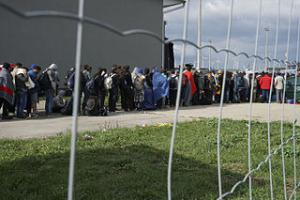RefugeesWave of refugees a major boost to German economy, society: Economists
A leading German economist says that Germany stands to gain from the wave of migrants arriving in the country. The long-term economic gains from the large number of refugees arriving in Germany, he said, will far outweigh the considerable immediate costs Germany faces. Germany is facing an imminent demographic crisis, which would see the country’s working population shrink by around 4.5 million over the next decade unless a sufficient number of immigrants is allowed to come and work. This promises great opportunities for new arrivals to be integrated into the workplace. “In the long run the refugees are an incredible opportunity for Germany,” says Marcel Fratzscher, the head of the German Institute for Economic Research (DIW).

Syrian refugees bound for Germany // Source: commons.wikimedia.org
Marcel Fratzscher, the head of the German Institute for Economic Research (DIW), has said that Germany stands to gain from the wave of migrants arriving in the country. The long-term economic gains from the large number of refugees arriving in Germany, he said, will far outweigh the considerable immediate costs Germany faces.
Fratzscher told the Guardian that the hundreds of thousands of newcomers this year as well as the hundreds of thousands more expected in coming years, offer a major opportunity for Germany, and that the country’s strong financial position makes it ideally placed to welcome them.
“In the long run the refugees are an incredible opportunity for Germany,” Fratzscher said. “Because of the surplus in the public budget, and a labor market that’s doing incredibly well, there’s probably never been a better moment in the last seventy years for Germany to deal with the challenge.”
DIW says that in a study published on Thursday, Fratzscher and co-author Simon Junker conclude that while the current situation, with thousands of refugees continuing to arrive daily, poses a daunting economic and social challenges, the benefits of absorbing the refugees will clearly start to outweigh the costs “within the next five to ten years.”
The authors recognize “the chaos and fears” in some parts of Germany and the “huge logistical challenge” the country faced, but Fratzscher insists that the government’s open-door policy would change German society for the good.
The Guardian notes that Fratzscher is one of the leading voices of a growing number of German senior public policy analysts and economists who argue that because of Germany imminent demographic crisis – a shrinking and aging population – the refugees can help German society.
The DIW report reaches similar conclusions to those of a recent report by the Macroeconomic Policy Institute, which said the refugees would boost the German economy and “act almost like a stimulus program” by forcing long overdue investments in Germany’s weakened infrastructure.
David Folkerts-Landau, chief economist with Deutsche Bank, agrees, saying that the influx of refugees has “the potential not just to invigorate our economy but to protect prosperity for future generations.”
Joachim Möller, head of the Institute for Employment Research, has told the Guardian that one reason for hope is the young age of most of the refugees. “Because the majority of them are under-25, there’s a lot of potential there.”
